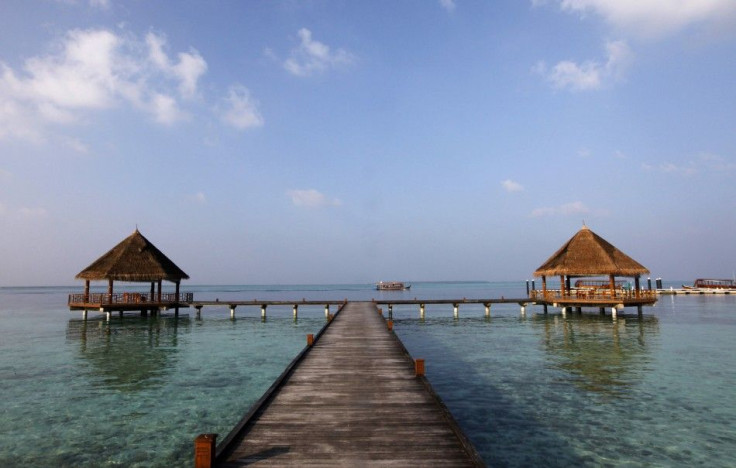Why Millions Are Boycotting The Maldives

Behold the power of social media: In less than two week’s time, nearly 2 million people have signed an online petition on Avaaz.org to boycott the Maldives unless it reforms its judicial system.
The petition stems from the case of a 15-year-old rape victim who was sentenced last month to 100 lashes for premarital sex. The young girl, from the island of Feydhoo, reportedly confessed to having consensual sex during an investigation into separate rape allegations against her stepfather and other men on the island. The stepfather allegedly killed the child she bore, and the girl’s flogging has been deferred until she turns 18.
“As concerned global citizens, we call on you to do more to protect vulnerable women and children,” the petition’s creators wrote in a letter to President Mohammed Waheed Hasaan. “We welcome your government’s initial intervention in the case of the 15-year-old rape victim, but real justice will only be delivered when you end the practice of flogging in the Maldives, and change the law so that it better protects the victims of rape and sexual abuse.”
The petition calls for an “end to this lunacy” and urges the public to hit the Maldivian government where it hurts: the tourism industry.
“Let's build a million-strong petition … then threaten the islands' reputation through hard-hitting ads in travel magazines and online until [the president] steps in to save her and abolish this outrageous law.”
The petition had more than 480,000 shares on Facebook and nearly 50,000 tweets by Tuesday evening.
Virgin boss Richard Branson added his voice to the cause last week. On his blog, he said the issue was causing “enormous damage” to the islands. He claimed to have written to Waheed, who “promised to review the case and ensure that similar cases are not repeated.”
Waheed came to power in February 2012 following a highly controversial mutiny by sections of the police and military. Political tensions remain high in the Muslim nation leading up to presidential elections later this year.
Waheed’s government issued an official statement on the case of the 15-year-old sexual abuse victim in late February, calling it “deeply concerning.”
“The government believes she is the victim of sexual abuse and should be treated as such by the state and the society and therefore, her rights should be fully protected. The government is of the view that the case merits appeal. The girl is under state care and the government will facilitate and supervise her appeal of the case, via the girl’s lawyer, to ensure that justice is done and her rights are protected.”
The attorney general in the Maldives has appealed the case on behalf of the child.
The Maldives welcomed a modern democratic constitution in 2008, but much of the corresponding legislation aimed at reforming the criminal justice and juvenile justice systems has yet to be enacted. Many bills essential to reforming the system are pending, including amendments to the Childs Rights Act and the revised Penal Code and Juvenile Justice Bill.
Moreover, the Maldives Constitution does not allow any law that contradicts the tenets of Islam.
Deputy Tourism Minister Mohamed Maleeh Jamal slammed the “dubious” motivations behind the Avaaz.org petition in the local English-language Minivan News, calling it counterproductive to change and “politically motivated.”
“We are in the middle of a successful democratic transition. Killing the most important industry in the country will not give way for reforms, but chaos and anarchy,” Maleeh said.
Tourism at the islands’ high-end oceanfront resorts accounts for roughly a third of the Maldives’ GDP, and Maleeh said the industry has been a key factor in ensuring national development and democratic reforms.
“In recent years, the democratic system has helped tourism, so we encourage openness and are not afraid of media,” Maleeh said. “What we want to see is correct information being out there. There needs to be more accountability with stories proven with facts.”
The Maldives signed a $150,000 per month contract with public relations group Ruder Finn to try and improve the country’s image internationally after political instability scared many visitors away. It also inked a deal with BBC through sponsorship of its weather services for $250,000 to push its new slogan: “Sunny Side of Life.”
However, numerous boycotts over the past year have branded the islands as a place to see the “Cloudy Side of Life.” A pro-democracy group took over the Twitter hashtag #sunnysideoflife last year to blast the nation’s alleged injustices. Amnesty International also released a publication last year titled “Another Side of Paradise,” highlighting alleged human rights abuses occurring in the shadows of the popular resorts. Even former President Mohamed Nasheed, who came to power in 2008 following the 30-year authoritarian rule of Maumoon Abdul Gayoom, has urged vacationers to avoid the Maldives under the current government.
© Copyright IBTimes 2024. All rights reserved.






















